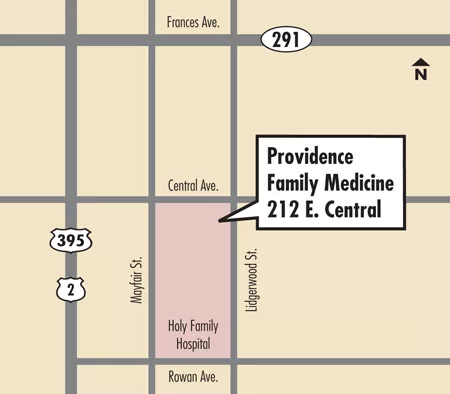Providence, Premera test new model
Health care entities join to test medical program at Spokane doctor clinic

Premera Blue Cross and Providence Health & Services have joined forces to support what their leaders call a different health care model through what's termed a patient-centered medical home program.
In Spokane, some Providence patients will begin to see this model of health care emerge in early June as a pilot project is launched at Providence Family Medicine, a doctors' office with five physicians located at 212 E. Central.
The medical home model is what a growing number of medical and insurance groups are embracing as a new approach to organizing health care that combines a team of doctors, nurses, and other caregivers working closely with patients to manage all aspects of basic care. Eventually, it also will seek to increase patient access through such methods as secured messaging, or emailing of questions, directly between patients and health care providers.
Overall, the collaboration is aimed at redesigning how health care is delivered, says Bill Akers, a Premera vice president and Eastern Washington general manager.
"The current path of health care is unsustainable, and it has to fundamentally change," he says, adding that the medical home model seeks not only to improve patient's long-term health and access to primary care but also control costs.
"The underlying issue is the affordability; we're going at that issue," Akers says. "Premera is the largest insurance provider in the state, and Providence is the largest health care provider in the state. We feel now is the time to step in and define (this new model). We're taking responsibility for making sure there is a funding that helps sustain it."
Other health care groups around the state have established a medical home concept, including Rockwood Clinic PS, the big Spokane-based doctors group here owned by Community Health Systems Inc., and Seattle-based Group Health Cooperative. Group Health began using a medical home concept in 2009 and now uses it at all of its 26 medical centers, which include four in Spokane.
Based on two years of using the model, a study published in the journal Health Affairs found that patients in Group Health's medical home environment experienced 29 percent fewer emergency room visits and 6 percent fewer hospitalizations.
A goal of the medical home model is to reduce health care costs by decreasing emergency room visits, avoidable hospitalizations, and trips to urgent care facilities, with an emphasis on preventive care.
At the end of April, Providence had announced that it's setting up medical homes in five locations—two in Olympia and one each in Everett, Walla Walla, and Spokane—and as part of that, supporting about 2,700 Premera members in those clinic sites. Premera, meanwhile, will pay an undisclosed monthly per-patient member management fee as a way to support the model, beyond its standard payment of claims.
The Spokane pilot will begin with a group of diabetes patients, because of an early focus on people with chronic health conditions. The program, however, will grow to include other groups with chronic conditions, such as those with asthma and congestive heart disease. Eventually, it's expected to affect the approach for all patients at the pilot site, says Joe Robb, Eastern Washington spokesman for Providence.
He says the medical professionals involved in the pilot aren't sure yet how many Providence patients will become part of the new program. Robb says that the concept is expected to allow for groups to meet at the clinic sites, meaning people with diabetes can gather and share about what care is working for them and what isn't, he says.
The lead physician for the Spokane Providence medical home pilot program will be Dr. R. Kim Hartwig. She will be supported by Dr. Janet Deegan. The nurse assigned to the pilot will be doing "heavy health education," for patients, Robb adds. Many see this core health care position as one who does more one-on-one coaching with patients on how to take better care of their health.
Providence also is moving toward a new information technology system that will eventually allow people to check their latest lab results online if they have secured access, and email with questions about their health or understanding their medication, he says.
Related Articles

_c.webp?t=1763626051)
_web.webp?t=1764835652)

